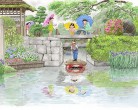
初三英语作文练习题推荐【一】
习惯成自然
①“习惯成自然”,这句老话很有意思。
②我们走路为什么总是左脚往前,右脚往前,两只胳膊跟着动荡,保持身体的均衡,不会跌倒在地上?我们说话。为什么总是依照心里的意思,先一句,后一句,一直连贯下来,把要说的都说明了?因为我们从小习惯了走路,习惯了说话,而且“成自然”了。什么叫做“成自然”?就是不必故意费什么心,仿佛本来就像那样子的意思。
③走路和说话是我们最需要的两种基本能力。推广开来,无论哪一种能力,要达到了习惯成自然的地步,才算是我们有了那种能力。不达到习惯成自然的地步,勉勉强强地做一做,那就算不得我们有了那种能力。如果连勉勉强强做一做都不干,当然更说不上我们有了那种能力了。
④听人家说对于样样事物要仔细观察才能懂得明白,心里相信这个话很有道理。这时,并不是我们就有了观察的能力。听人家说劳动是人人应做的事,一切的生活资料,一切的'文明文化,都从劳动产生出来,心里相信这个话很有道理。这时,并不是我们就有了劳动的能力。听人家说读书是充实自己的一个重要法门,书本里包含着古人今人的经验,读书就是向许多古人今人学习,心里相信这个话很有道理。这时,并不是我们就有了读书的能力。听人家说必须做个好公民,现在是民主时代,个个公民尽责守分,才能有个好秩序,成个好局面,自己幸福,大家幸福,心里相信这个话很有道理。这时,并不是我们就有了做好公民的能力。
⑤这样说下去是说不完的,就此打住,不再列举吧。
⑥要有观察的能力,必须真的用心去观察。要有劳动的能力,必须真的动手去劳动。要有读书的能力,必须真的去把书本打开。要有做好公民的能力,必须真的去做公民应做的一切事情。在相信人家的话很有道理的时候,只是个“知”罢了,“知”比“不知”似乎好些,但仅仅是“知”,实际上与“不知”并无两样。到了真的去观察去劳动去读书的时候,“知”才会渐渐化为我们的习惯,习惯成自然,才是我们的能力。
⑦通常说某人能力不强,就是某人没有养成多少习惯的意思。譬如说张三记忆力不强,就是张三没有一个把看见的听见的一些事物好好记住的习惯。譬如说李四发表力不强,就是李四没有一个把自己的思想和感情说出来写出来的习惯。
⑧习惯养成的愈多,那个人的能力愈强。我们做人做事,需要种种能力,所以最要紧的是养成种种习惯。
⑨养成习惯,换个说法,就是教育。教育不限于学校,也不限于读书。学校教育只是教育的一部分,读书这门事也只是教育的一部分。我们在学校里受教育,目的在养成习惯。我们离开了学校,仍然要从种种方面受教育,并且要自己教育,目的还是在养成习惯,增强能力。习惯越自然越好,能力越增强越好,孔子一生“学而不倦”,就是看透了这个道理。
(作者:叶圣陶)
20、文章第②段以走路、说话为例,引出了下文什么观点?(用文中的句子回答)(2分)
答:_____________________
21、第④段列举了哪些事例?意在阐明什么?(3分)
答:_____________________
22、简要概括⑥—⑧段的论证过程。(4分)
答:_____________________
20、无论哪一种能力,要达到了习惯成自然的地步,才算是我们有了那种能力。(评分:2分)
21、观察、劳动、读书、做一个好公民等四个事例。意在阐明,只有在“知”的基础上通过“行”去养成某种习惯,才能算是具有了某种能力。(评分:本题3分,第一问2分,第二问1分)
22、第⑥段,承接上文的举例论述,进一步阐述在知的基础上培养习惯的重要;第⑦段,举出反面的例子证明能力和习惯的关系;第⑧段,进行小结,再次强调养成种种习惯的重要。(评分:共4分,每段1分,语言表达流畅1分)
初三英语作文练习题推荐【二】
汉字与英语是世界上使用人数最多的语言,拼音可以说是两者的一部分结合体,生活中的很多事都要用到拼音,那既然这样的话,三者一定有很大的共同点,我们可以来讨论讨论。
先说汉字,汉字是源于中国,是中国的古老文化、中国的国粹。我们现在有些人甚至一些老师都认为他们已经算是识字了,可事实上并不是如此。中华文化,博大精深、根深蒂固,
从最初的甲骨文到金文再到后来的隶书、篆书、标准的`楷书、和现在的行书成千上万,现在发现的甲骨文有4500多种单行字,可我们能够识别的只有1000种。金文是甲骨文的演化,是新的智慧的结晶,而现在发现了4000种,但我们能够识别的只有20xx种,可见中华文化的精彩。文字有两种含义,“文”代表的是某种事物的外形表现,艺术的表现。而“字”则是在外形表现上的规范化。
英语是来源于欧洲,而实际上,英语比汉字更加复杂,、繁琐,英语与中文的相同点在于都有类似于主、谓、宾,这样的语法规则,都有音标,中文的拼音。而不同点在于,发音规则,比如:中国人发音位置在喉咙处,因此声音清脆,而英国人发音位置则是在胸腔、腹腔位置上,声音比较浑浊,沉重,语言习惯,语言序法不同。比如how are you?意思是你在干嘛?而中国人一般在后面加一个疑问字加一个问号,如果用我们中国的文化来翻译的话则成为:“什么、是、你、做”,显然不通顺,而这就是英国人的习惯了,把重要的词语放在前面,作用不太大的放到后面,与中文相反,这就是两种无言的相同处于不同处。
拼音是两种语言的集合体,运用很广,它有英语的音标,中文的规则。而实际上,它是一种发音的语调,与英语、中文相同的一点是。它拥有鼻音、前鼻音、后鼻音等发音规则,只要使用这些语调,就会发生改变,通俗的说:就是方言。实际上,这个世界上哪里有最标准的语言?每个人与每个人说话的音调不同,比如:四川人于云南人的话语有很大差别,当你敢说不是中文吗?不是中国话吗?外国人也有,民族与民族之间,地区与地区之间。曾经就有这样的一个笑话:以前云南省有位干部是南方一个小城市的人,再一次大会上,拿着文稿在演讲到:我们云南是一个美丽的城市时,一阵风把稿子吹飞了,他便发火说道:“雀神怪鸟的”。听众疑惑,有人便对他说道:“是要先放气球,后放鸽子。”于是他说道:“放雀”于是有人又说:“是鸟,不是雀。”可他仍然说道:“是雀的嘛。”这个故事实际上是让我们知道:话,都是中国话,但由于音调使得听的人听不懂,从而变为了另外一个意思。而拼音实际上就是取到了规范音调的效果。这是与中文、英语最大的相同点!
语言,看似千变万化,实则一通百通,只要懂了习惯与不同点,是可以归纳出另一种语言的规则,从而更好的学好语言!
初三英语作文练习题推荐【三】
(一)改写一般疑问句:
(1)原句中有be动词的,将be动词提前,其他顺序不变。
例如:Thisisacat.变为Isthisacat?
(2)原句中有情态动词的(can/may/shall/would)将情态动词提前,其他顺序不变。例如:Hewouldlikeapie.变为Wouldhelikeapie?
(3)原句中是一般动词的,在句首加助动词do或dose(用于主语是第三人称动词单数的句子),其他顺序不变。例如:Iplaytheguitar.变为Doyouplaytheguitar.
(4)原句中的some变any。
注:以情态动词开头的一般疑问句,并且要求对方做肯定回答的`some不变。
(5)原句中的第一人称改为第二人称。例如:Iamanurse.变为Areyouanurse?
(6)以dose开头的一般疑问句,原来动词的第三人称单数形式要变回原形。例如:Hereadsastorybook.变为Dosehereadastorybook?
(二)改写否定句:
(1)原句中有be动词的,直接在be动词后面加not。例如:Itisadog.→It’snotadog./Itisn’tadog.
(2)原句中有情态动词的,直接在情态动词后加not。
例如:Iwouldlikeahotdog.→Iwouldnotlikeahotdog.
(3)原句中是一般动词的,在一般动词前加don’t或doesn’t(用于主语是第三人称单数的句子),doesn’t后面用原型。例如:Iseethreehamburgers.→Idon’tseethreehamburgers.
原句中的some变any例如:Ihavesomebreadan
dmilk.→Idon’thaveanybreadandmilk.
(4)以let开头的祈使句,如果是letus或letme,直接在其后加not;如果let后面其他人称代词宾格(you、him、her、them、it)就在let后面加助动词don’t。例如:Letusgotothepark.→Letusnotgotothepark.再如:Letthemdohomework.→Don’tletthemdohomework.
(三)对划线部分提问:
对划线部分提问,就是先把一个陈述句的划线部分去掉,然后变为一个特殊疑问句:一是特殊疑问句+一般疑问句;
二是特殊疑问句+陈述句(对主语或主语的定语提问,therebe结构除外)
⑴划线部分是人,用who提问。
⑴划线部分是主语,用who提问,who后面的动词要用第三人称单数形式。如:Whois;Wholikes;Whohas?
方法:who+原句的剩余部分
例如:①HelenandMikearelisteningtomusic.
→Whoislisteningtomusic?
②Ihavesomemodelplanes.
→Whohasanymodelplanes?
⑵划线部分是表语,用who提问。
方法:Who+剩余部分的一般疑问句形式
⑵划线部分是事或者物,用what提问。
方法:what+剩余部分的一般疑问句形式。
注:如果原句是therebe句型,直接用What’s+地点状语来提问。例如:①Wewouldliketobuysomethingsforaparty.
→Whatwouldyouliketobuyforaparty?
②Therearealotofcakesintheplate.
→Whatisintheplate?
⑶划线部分是物主代词或名词所有格,用Whose提问。
方法:⑴划线部分是主语的定语时,Whose+剩余部分
例如:Ourclassroomisbright.
→Whoseclassroomisbright?
⑵划线部分是表语或表语的定语时,Whose+剩余部分的一般疑问句形式例如:①ThewomanisSuYang’steacher.
→Whoseteacheristhewoman?
注:对某部分的定语提问,被修饰的部分跟随特殊疑问句往前提②ThispurseisYangLing’s.
→Whosepurseisthis?
⑷划线部分是地点,用where提问。
方法:where+剩余部分的一般疑问句形式
例如:TheyarehamingaMathslessonintheclassroom..
→WherearetheyhavingaMathslesson?
⑸划线部分是“多少”,用howmany或howmuch提问。
方法:⑴句中是可数名词的用Howmany+剩余部分的一般疑问句形式例如:Therearefifteentreesintheplayground.
→Howmanytreesarethereintheplayground?
⑵句中是不可数名词的用Howmuch+剩余部分的一般疑问句形式例如:Ihaveaglassofjuiceforbreakfast.
→Howmuchjuicedoyouhaveforbreakfast?
⑹划线部分是时间,用when或whattime(具体的几时几分)提问。方法:⑴when+剩余部分的一般疑问句形式
例如:SuYangandSuHaiareathomeonSundaymorning.
→WhenareSuYangandSuHaiathome?
⑵问具体的时间直接用Whattimeisit?或What’sthetime?问
例如:It’sthreeforty-five.
→Whattimeisit?或What’sthetime?
初三英语作文练习题推荐【四】
考辅P42
1.IgaveTomthebook.//
2.Heboughthismothersomeflowers.//
3.Thebridgewasbuiltbyworkerslastyear.//
4.Wehavetofinishtheworktoday.//5.Hewilldohishomeworktomorrow.//
6.Wecleantheroomseveryday.//7.Thewriterspent3yearsonthebook.//
8.Itisabookwithalotofbeautifulpictures.//
9.Thebooksoldverywellduringthefirstweek.//firstweek.
10.Marywastheonlyoneintheoffice.//
11.Shefinishedherworkat10o’clock.//Shedidn’12.Shehadtotakeataxihomebecauseitwastoolate.
13.LizaandMikearrivedattheGreatWallintwohours.
14.Theywerehappytogettothetop.//
15.TheyenjoyedthemselvesontheGreatWall.//
16.ThepostmansentSusanandTommyapaperbox.
17.Theyopeneditandfoundapresentfromtheirfriend.
18.Theybothlikedthepresentandfeltveryhappy.
19.Alicedidn’tfeelwelltoday,soshewenttothehospital.
20.Thedoctoraskedhersomequestions.//
21.Thedoctordidn’tgiveheranymedicineintheend.
(全真1)
1.ThecapitalAirporthasbeeninusefor20years.//
2.ThecapitalAirportisthelargestoneinChina.//
3.Ihavenevertakenaplane.MyfriendLiPing,either.//
(全真2)
1.Fathergave$20formetobuysomebooks.//
2.IwasexcitedwhenIsawsomanygoodbooksinthebookstore.
3.ButsomebookswouldcostmorethanIhave.//
ButIdidn’//(全真3)
1.ManyChinesefriendswenttotheparty.2.Tonywasgivenalotofpresentsbyhisfriends.//Tony’
3.SeeinghisChineseteacheratthepartymadeTonyveryhappy.//(全真4)
1.Iwanttoeatsomething.//2.Therefrigeratorisempty.//3.Bobspentfifteenyuanonthehamburger.///(全真5)
1.Mr.Wangdoesn’tworkinthatfactoryanylonger.//
2.Mr.Wanglefthomeearlierinordertocatchthebus.3.Mr.Wangfindsitnoteasytogetalongwiththatyoungguy.//(专家1)
1.Manypeoplewentshoppingyesterday.
2.Janespent4hourstobuyNewyeargifts.//
3.Shewassotiredthatshecouldn’twalkanylonger.//
(专家2)
1.Myfriendssaidtome,“Areyoufree?”
2.Shewantedmetogoshoppingwithher.
3.Shethinksitapleasuretogoshoppingwithafriend.
初三英语作文练习题推荐【五】
按要求改写句子知识点梳理
一、概述
按要求改写句子主要考查学生对句子结构的掌握以及用不同句型表达同一意思的能力。考查所涉及到的句子类型有一般疑问句、否定句、反意疑问句、选择疑问句、对划线部分提问、感叹句、保持原句意思、合并成一句、简单句和复合句之间的互换以及改为被动语态等。
二、解题时需注意的几个要点
1、时态:不同的时态相对应的助动词
一般现在时:谓语动词用原形(主语为第三人称单数时,动词加s或es,变否定句、疑问句时助动词为do或does)
一般过去时:谓语动词用过去式,变否定句、疑问句时助动词为did.
现在完成时:助动词have/has+动词的过去分词
过去完成时:助动词had+动词的过去分词
一般将来时:will/be going to +动词原形
过去将来时:would/was or were going to +动词原形
现在进行时:am/is/are+动词的现在分词
过去进行时:was/were+动词的现在分词
2、语态:主动语态变为被动语态的谓语结构
一般现在时:am/is/are+动词的过去分词
一般过去时:was/were+动词的过去分词
一般将来时:will be+动词的过去分词
情态动词:can/may/must/need等情态动词+be++动词的过去分词
3、改反意疑问句时注意hardly, never, seldom, few, little, no等词表达的是否定意义,变反意疑问句时用肯定形式。
4、在合并句子时,有些连词如not only…but also…, neither…nor…, either…or…是就近原则,连接两个主语时动词形式取决于与动词邻近的主语。而both…and…连接两个主语时,主语是复数。
5、简单句和复合句之间的互换常见的有:带有疑问词的宾语从句改为特殊疑问词+to+动词原形的不定式;结果状语从句so…that…改为enough to或too…to…的简单句。
6、保持原句意思改写句子时注意时态不变。
三、习题
练习一
1. We do our homework every evening. (改为否定句)
We _________ ________ our homework every evening. 对划线部分提问
________ ________ do they have a class meeting?
3. She could hardly understand this passage. (改为反意疑问句
She could hardly understand this passage, _________ __________?
4.The manager told him how to get useful information. (改为否定句
The manager _________ _________ him how to get useful information.
5. Tom’s sister can speak English and Japanese very well. (改为反意疑问句
Tom’s sister can speak English and Japanese very well, _________ _________?
对划线部分提问
_________ _________ he live twenty years ago?
7. Sam does some cleaning in the morning. (改为否定句
Sam _________ do _________ cleaning in the morning.
对划线部分提问
_________ _________ have the students worked on the survey?
9. Your father used to ride a bike. (改成反意问句)
Your father used to ride a bike, _______ ________? (对划线提问)
__________ ___________ the population of Germany?
11. Mr. Wang washes his car once a month. (改为一般疑问句)
Mr. Wang (对划线部分提问
will Susan come back from Athens?
13. My friends lost their way when they were traveling in Hong Kong. (改为一般疑问句
________ your friends ________ their way when they were traveling in Hong Kong?
14. 对划线部分提问
________ ________ has Yao Ming been in the Rocket Team?
15. She put the digital camera on the bed just now. (改为否定句
She _________ _________ the digital camera on the bed just now.
16. Mark's flown to Hainan Island for winter holidays. (改为反意疑问句
Mark's flown to Hainan Island for winter holidays, _________ _________?
(专辑. (划线部分提问
_________ did Super Girl Zhou Bichang _________ to Vienna?
18. I’ve already saved enough money to buy a new car. (改为否定句
I ________ saved enough money to buy a car ________.
19. Lily used to have long straight hair. (改为反意疑问句
Lily used to have long straight hair, ________ ________?
20. He has already been there .(改为一般疑问句
__________ he been there __________?
21.They decided that they wouldn't have the picnic because of the bad weather. (改为简单句
They decided __________ _________ have the picnic because of the bad
weather.
22. The English people hardly ever shake hands between the strangers .( 改为反意疑问句
The English people hardly ever shake hands between the strangers, __________ __________?
23. They grew some sunflowers in their garden last year.(改为否定句)
They __________ __________ any sunflowers in their garden last year.
24. Jane drinks milk every morning.(改为一般疑问句)
_________ Jane ___________ milk every morning? (就划线部分提问)
___________ map ___________ to Class 4?
26. You can choose only one of the two: a mini-TV or a DVD player. (改为选择疑问句
you want a mini-TV a DVD player?
27. That detective film is so amazing. (改为感叹句)
___________ ___________ amazing detective film!
28. He has some money left.(改成否定句)
He money left.
29. (划线部分提问)
do the members of the film society meet?
30. His mother knew why the little boy was unhappy all day. (改为一般疑问句
_______ his mother _______ why the boy was unhappy all day?
31. He looks very funny with that hat on. (改为感叹句
_______ _______ he looks with that hat on!. 对划线部分提问
_______ _______ they build this factory?
33. I have already finished the test paper.(改为否定句)
I ________ finished the test paper ________.
34. Johnson denied cheating in the competition.(改为反意疑问句)
Johnson denied cheating in the competition, ________ ________? (对划线部分提问) ________ ________ the story need to be funny?
36. Sam does some cleaning in the morning. (改为否定句
Sam _________ do _________ cleaning in the morning.
对划线部分提问 _________ _________ have the students worked on the survey?
38. (对划线部分提问) _________ _________ has he been a top fashion designer?
39. 对划线部分提问
________ ________ will they move into the new school?
40. to go to the People’s Square by underground. (对划线部分提问
________ _______ did it take you to go to the People’s Square by underground?
练习二:
1. Gold is less valuable than diamond. (保持句意不变
Gold is ________ ________ valuable as diamond.
2. He told the children to go and watch his tank of Ghost fish. (改为被动语态 The children ________ ________ to go and watch his tank of Ghost fish.
3. Unless I have a quiet room, I cannot do any work. (保持句意不变)
I cannot do any work ________ I _________ have a quiet room.
4. The manager arrived here a few minutes ago. (保持句意不变)
The manager has _________here ________ a few minutes.
5. They will send him to work in Japan for one year. (改为被动语态
He will ________ _________ to work in Japan for one year.
6. The words on the notice board are very small. I can’t see them clearly.(保持句子原意
The words on the notice board are small I can’t see them
clearly.
7. We can solve the problems with the help of the teacher. (改为被动语态 The problems can _________ _________ with the help of the teacher.
8. We can’t finish the work in such a short time. (保持原句意思
It’s _________ _________ us to finish the work in such a short time.
9. We must keep the noise under 50 dbs.(分贝(改成被动语态)
The noise must ________ _______ under 50 dbs here.
10. Mike doesn’t like classical music. Billy doesn’t either. (合并成一句) _________ Mike nor Billy __________ classical music.
11. The room is so dirty that we can’t live in it.(保持句意不变)
The room isn’t __________ _________ for us to live in.
12. No one knows when we will start tomorrow. (保持原句意思)
No one knows start tomorrow.
13. The Smiths will invite the professor to take part in the party. (改成被动语态 to take part in the party by the Smiths.
14. If you are not brave, you’ll lose your last chance.(保持原句意思)
you are ’ll lose your last chance.
15. They store much information in the computer. (改成被动语态
Much information ________ ________ in the computer.
16. Don’t throw rubbish here and there. Our teacher said to us. (合并为一句
Our teacher told us ________ ________ throw rubbish here and there.
17. If John doesn’t apologize for what he did, I will tell the teacher about his bad behavior.
(保持原句意思)
_______ John _______ for what he did, I will tell the teacher about his bad behavior.
18. I don't know where we can grow vegetables in the city. (改为简单句 I don't know _________ _________ grow vegetables in the city.
19. People used to enjoy themselves chatting on MSN when it worked well. (保持句意基本不变
People used to _________ a lot of _________ chatting on MSN when it worked well.
20. If you don’t improve your handwriting, you will lose marks in the exam. (合成同义句
You will lose marks in the exam ________ you ________ your handwriting.
21. To go fishing is fun. (句意不变 )
_____ is fun _____ ______ fishing.
22. Dick was so short that he couldn’t touch the top of the bookshelf.(保持句意基本不变)
Dick wasn’t __________ __________ to reach the top of the bookshelf.
23. “Can I borrow your bike for a while or not?”( 保持句意基本不变)
Tom asked his sister __________ he __________ borrow her bike or not for a while.
24. The couple couldn’t decide which flat they should choose at first. (保持原句意
思)
The couple couldn’t decide which flat at first.
25. Meaningless information is difficult for the little boy to remember. (保持原句意思)
is difficult for the little boy remember meaningless information.
26. People throw away millions of plastic bags in our city every day. (改成被动语态)
Millions of plastic bags away in our city.
27. She was so careless that she couldn’t find the mistakes in her test paper. (保持句意基本不变
She was _______ _______ to find the mistakes in her test paper.
28. We will hold the next Olympic Games in Beijing in 2008.(改为被动语态)
The next Olympic Games will _______ _______ in Beijing in 2008.
29. The elderly man pushed the birds into the river.(改为被动语态)
The birds ________ ________ into the river by the elderly man.
30. Dolphins are so clever that they can follow the instructions.(保持句意基本不变) Dolphins are ________ ________ to follow the instructions.
31. We can’t finish the work in such a short time. (保持原句意思
It’s _________ _________ us to finish the work in such a short time.
32. They invited the astronaut and his wife to the party on Christmas Eve.(改为被动语态
The astronaut and his wife _________ _________ to the party on Christmas Eve.
33. The little girl didn’t go to bed unless the grandmother told her a story. (保持句意基本不变
The little girl didn’t go to bed _________ the grandmother _________ tell her a story.
34. The plane is so big that it can carry 300 passengers at one time. (改为简单句)
The plane is big _________ _________ carry 300 passengers at one time.
35. Did they know the answer to the question? Ididn’t know… (合并为一句 I didn’t know ________ they had ________ the answer to the question.
Keys
练习一
1. don’t do 2. How often 3.could she 4.didn’t tell 5.can’t she
6.where did 7.doesn’t any 8.How long 9.didn’t he 10.What is
初三英语作文练习题推荐【六】
1. Nancy is too young to dress herself.
Nancy is not _____ _____ to dress herself.
2. My watch doesn't work well.
There is ____ _____ _______ my watch.
3. Jane doesn't go to work by bus any longer.
Jane ____ _____ _____ to work by bus.
4. It took Mary two weeks to prepare for the exam.
Mary _____two weeks____ ______ for the exam.
5. It seems that they have known each other.
They seem to _____ _____ each other.
6. "My grandpa doesn't like coffee or coke" said Bob
Bob said that _____grandpa liked _____coffee _____coke.
7. Cao Fei joined the League three years ago.
Cao Fei _____ ____ _____ the League for three years.
8. I prefer walking there to going by bus.
I prefer to walk there ____ _____ going by bus.
9. -Thank you very much. -You're welcome.
- ____ a lot. -Not at____ .
10. Kitty does well in English.
Kitty ____ ____ ____ English.
11. They realized Hainan was a beautiful place after they reached there.
They____ realize Hainan was a beautiful place_____ they reached there.
12. We will have to finish the work hardly if you don't help us. We can't finish the work _____ _____ ______
13. My dictionary isn't so thick as yours.
My dictionary is _____ than yours.
14. Could you tell me where the East Street Hospital is? Excuse me, ____ is the _____ to the East Street Hospital?
15. The book is exciting to read.
It is ____ _____ read the book.
16. Jack's mother asked him, "Have you packed your things?" Jack's mother asked him ____ he ____ packed his things.
17. She likes singing better than dancing. She ____ singing ____ dancing.
18. Remember to ring me up as soon as you get to Nanjing Make ____ to give me a ring as soon as you _____ Nanjing.
19. They couldn't catch the train because of the heavy traffic. The heital?
15. The book is exciting to read.
It is ____ _____ read the book.
16. Jack's mother asked him, "Have you packed your things?" Jack's mother asked him ____ he ____ packed his things.
17. She likes singing better than dancing. She ____ singing ____ dancing.
18. Remember to ring me up as soon as you get to Nanjing Make ____ to give me a ring as soon as you _____ Nanjing.
19. They couldn't catch the train because of the heavy traffic. The heavy traffic _____ them from _____ the train.
20. My brother has been away from home for two days.
My brother _____ home two days _____ .
21. Li Lei decided to move to Canada when he was thirty.
Li Lei made a _____ to move to Canada at the _____ of thirty.
22. Jim was too careless to pass the exam last term.
Jim was not_____ _____ to pass the exam last term.
23. If you don't hurry up, you can't catch the train.
Hurry up, _____ you may _____ the train.
24. Yang Li wei said to us, "I'm going to visit your school tomorrow. " We were all pleased.
We were all pleased when we heard Yang Li wei_____ visit_____ school the next day.
25. This is the most interesting film I have ever seen. I have ____seen _____ an interesting film before.
26. I was late for school because of the traffic accident. The traffic accident _____ me _____ getting to school on time.

















